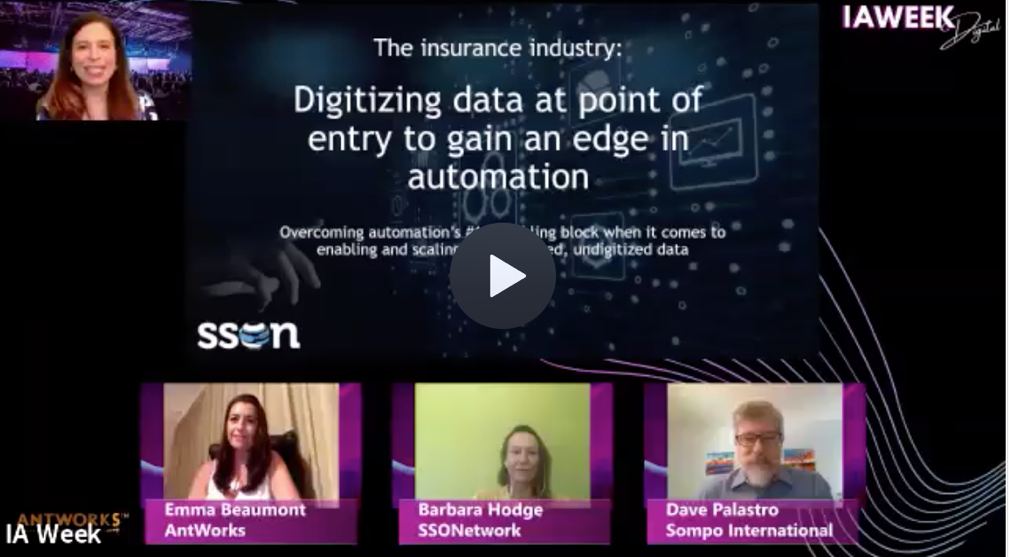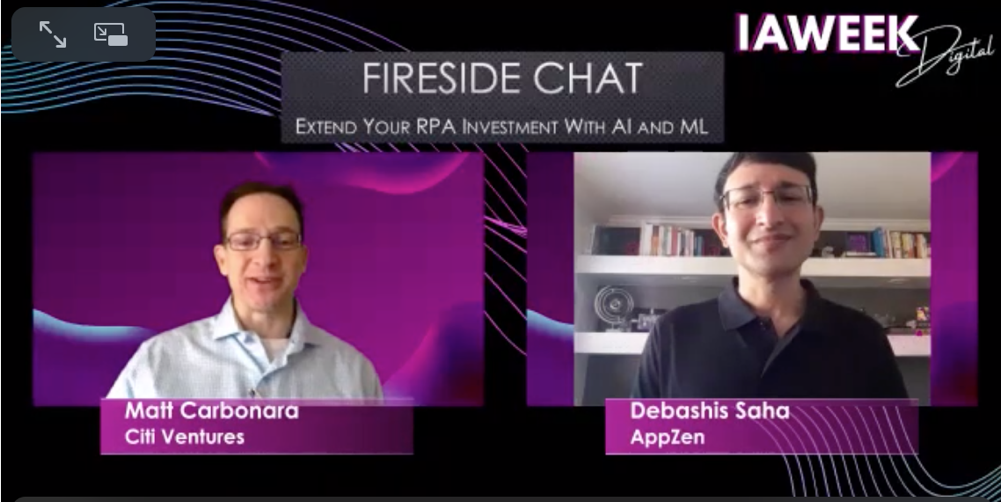Inside Scoop: Intelligent Automation Week 2020
 Over the last two weeks, Intelligent Automation was the hot topic of discussion in our industry. With the conference going all digital this year, practitioners, service providers, and line of business executives had a front-row seat from their homes to some game-changing innovation in AI-driven techniques.
Over the last two weeks, Intelligent Automation was the hot topic of discussion in our industry. With the conference going all digital this year, practitioners, service providers, and line of business executives had a front-row seat from their homes to some game-changing innovation in AI-driven techniques.
There were some fascinating sessions, and I want to present my thoughts as I had attended a few of these. Now, the first of these was around “Digitizing All Data at the Point of Entry to Gain an Edge in Automation.” This session was focused on the Insurance industry and featured speakers Dave Palastro of Sompo International, Barbara Hodge of SSON, and Emma Beaumont of AntWorks.

There were some intriguing findings presented. First, Covid-19 has proven that when it comes to business processes, the human link is still the weakest link—and digitization is paramount. Second, data emerges as ground zero for new revenue streams. Lastly, it has become critical to digitize and structure data at the point of entry into a business process as a critical transformation enabler, thereby minimizing inefficiencies. Automation drives tremendous results and removes inefficiencies, while the limiting factor appears to be data.
The speakers talked about some of the challenges where data came in a multitude of formats—paper, e-mail, legacy systems, and unstructured data that traditional OCR tools cannot parse and process. The combined pressures of new competition and outdated methods exacerbate the challenges. The panel described how the digitization of data was essential in feeding analytics, driving automation, and providing customer insights that are the key to keeping up in today’s markets. Great session, Emma, Dave, and Barbara—we hope to hear more from you over the next several months.
Another session that caught my eye was “Extending your RPA investment with AI and ML,” presented by my friend Matt Carbonara, at Citi Ventures and Debashis Saha at AppZen.

I’ve known Matt for a few years (from his days at Comcast and Cisco), and I was excited to hear what he had to say about AI and ML and its ability to extend RPA. One of the items that they talked about was framing a horizontal or platform approach to Automation, and another vertical or purpose-built approach that drives dramatic time to value.
This concept resonates significantly with my team and me. We believe that being focused and delivering value in a functional—or pillar-centric—fashion is critical to achieving rapid value, and showing how to achieve outcomes quickly.
The verticalized taxonomy of AI/ML is another benefit that companies can take advantage of, especially with a network effect for companies leveraging the platform. It was also great to hear some examples from the speakers around semantic understanding and contextual classification, on which their OCR offerings focused. The comment around dealing with vast volumes of unstructured data was reinforced here as well. Very cool indeed, and again, looking to hear more from Matt and Debashis over the next several months.
This year, Auditoria was one of the sponsors of the event. As one of the pioneers in HyperAutomation for ERP and Finance, we are actively innovating in Machine Learning, Natural Language Processing, and Deep Neural Networks. Our goal is to deliver the industry’s most comprehensive cognitive automation platform, which automates tasks, analytics, and interactive responses in simple SaaS service. I was thrilled to host a panel discussion on “Leveraging Machine Learning to Transform Data into Actionable Insights.”
Joining me on the panel were Susheel Nesargi, Head of Intelligent Automation from Fidelity FIS Global, and Stefan Rank, Director of Global Innovation from DHL. We discussed some of the initiatives that Susheel and Stefan had driven in Automation in their companies.
We then explored how they analyzed incoming client tickets and issues to determine how to identify patterns in the incoming queries. The analysis allows them to make sense of patterns and then translate them into knowledge clusters to predict root cause and route issues intelligently to improve client satisfaction.
We talked about how Machine Learning is playing an increasingly important role in accelerating automation. We finally ended by outlining the key challenges in the adoption of ML techniques. The relative paucity of data and access to knowledgeable talent were some of the points covered. Here is a link to our session. I’d love for you to listen in and give me your feedback.
It was a fun week, and for those of us focused on Automation, AI/ML/NLP, and the opportunity to accelerate digital transformation – it is now a reality. The breadth of content and depth of speakers was terrific to see. I can’t wait for next year’s event, and hopefully, it will be in person and allow us to take our efforts to another level.
Until then – Keep Automating Intelligently!!!
